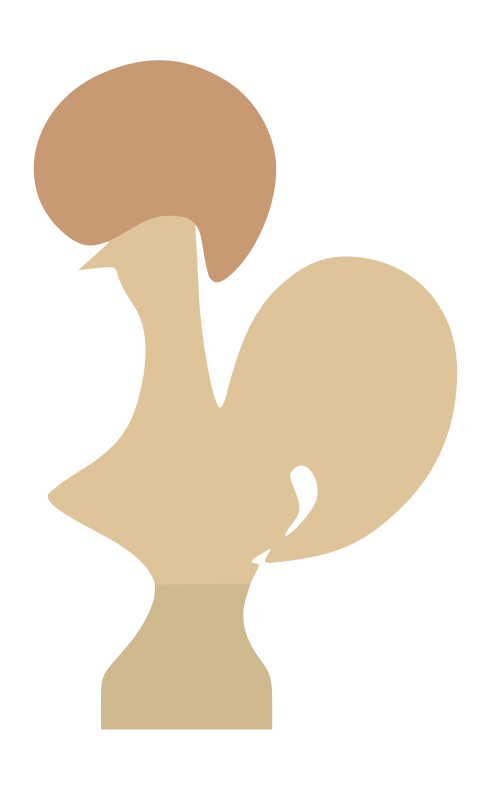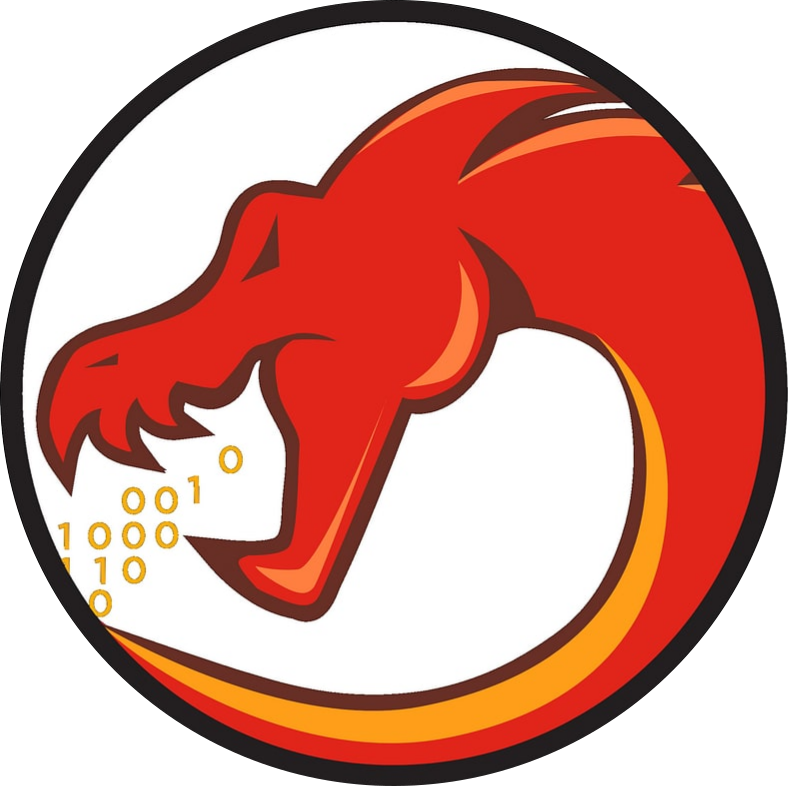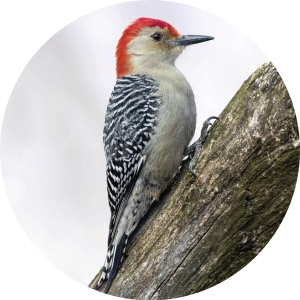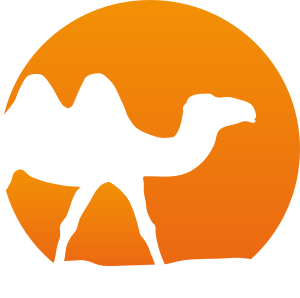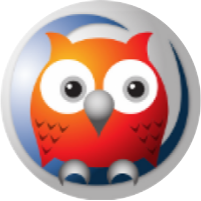Welcome to the personal/professional homepage of Ilan Buzzetti the adoring husband of the lovely Angelica Li. As with all ineligible ex-bachelors he comports himself with dignity and good humour. He is in his third year of doctoral studies, advised by the brilliant Kevin W. Hamlen in the scientific pursuit of Cybersecurity through Formal Methods. He conducts his work as part of a small and close-knit team at the University of Texas at Dallas, home to the feared Temoc and the revered Enarc, and is the grateful recipient of the NSF's creatively named CSGrad4US scholarship and UTD's esteemed Eugene McDermott Graduate Fellows Program.
And now a word from the man himself...
Hello! And welcome to my homepage! This serves both personal and professional purposes, which I believe to be inseperable at the granularity of leaders. That is, the professional character of an organization is inseperable from the personal character of its leaders. I am a leader of the organization comprised exclusively of myself, thus it is important for professional relationships to get a sense of the leader's character, namely myself.
For potential personal relationships I think an idea of the person's profession is also relevant. A person's profession accounts for a large part of how they spend their time and mental effort. It shapes not only how they see the world, but which parts of the world they see. This latter aspect, in combination with their personal values, is critical for understanding their decisions and attitudes, and I think it is the foundation of what we conceive of as expertise.
I was born prima facie a biological male, a U.S. of A. citizen, and a son. Over time I became more of a biological male, an Israel citizen, and a serial user of the oxford comma. At an age best measured in weeks, I was stowed under an airplane seat and crossed the Atlantic to settle in Kibbutz Lehavot Haviva, Israel, the hometown of my unnamed stower. At an age best measured in years, I had my first experience of airplane food on the way back across the Atlantic to the grooving city of Austin, Texas. Nothing notable happend at an age best measured in months, does it ever?
Until the DEI movement came into full swing Perhaps "fuller" is more correct. I'm no historian. The point is that it took a while to reach the consciousness of the STEM fields I'm involved in., I had no cause to consider the merits of my background in a reductive value system that focuses on laundry lists rather than character and context. But now I realize I sit on diversity gold. I was ripped from my homeland without my consent and lived as a first-generation immigrant as early as a few weeks of age. Since the age of five-ish I exchanged my first-generation privileges in favor of being the second-generation child of two first-generation parents. This was perhaps more of a lateral move, maybe an unadmitted blunder, than a move upwards, but I played the hand I had and have no regrets about it. My bloodline is mixed, which gives me the privileged class of all minorities in my bloodlines, including Chileans and displaced Jews. Though this latter part is not likely to win the favor of any laundry list afficionados these days... Alas, consider it an investment for the future.
What's this OneO thing? Indeed, a good question. The easiest label to give this label defying noun is "a way of life."
On October 2021, at the peak of my self-improvement, fitness and optimization kick, I joined an online self-healing self-tuning group at my friend's invitation after trying a live session and feeling sensations in my body. Since then I've bought in to the prophecy that when 232,648 people live OneO A Way of Life, the world will tip back into balance, and have committed to being one of. "Preposterous"" on two accounts, one, it is a prophecy, and two, that is "only" an inconsequential 0.003% of the present estimated population of Earth, it might surprise some that a thoughtful and intelligent man has defected from the camp of intellectually enlightened atheists to join what on the surface looks like a cult, albeit one emphasizing kindness to self and independenceAll answers come from within. There is no one higher than you. from the alleged cult? Well, first, witness the same guy calling the results of a coin flip for 99-100% of a few hundred trials and the reasonable choice becomes taking him seriously (though the mind will resist). Second, make kindness-to-self the king of your value system and ignoring the impacts it has on you and the people around will become a full time job. Seriously, try it. No money down. In my own life, I have noticed that every time I commit to prioitizing being kind to myself at the cost of, say, professional achievement or emotional comfortE.g., procrastination, avoidance, putting on a mask., I get younger and life unfolds with more ease. When I prioritize anything to the detriment of being kind to myself I get physically older: I find new aches in my body and a new grumpyness and rigidity in my thoughts.
Reading Recommendations
- The Giving Tree - Shel Silverstein : this one doesn't need any explanation. It is timeless.
- Be Nice to Spiders - Margaret Bloy Graham : very important for kids to read so they have a positive relationship with spiders.
- The Malazan Book of the Fallen - Steven Erikson : the most life changing and engaging fiction series I have read.
- The Potent Self - Moshe Feldenkrais : the intro and a quick skim is enough to have a thought provoking experience. I especially find his conceptualization of maturity to be useful in reflecting on my actions and responses to my environment.
- The Ware Tetralogy - Rudy von Bitter Rucker : a fun science fiction tetralogy. Not much of those out there.
- Dark Lord of Derkholm - Diana Wynne Jones : a fun D&D style fantasy. Wikipedia says it is a parody, I think it is a satire along the lines of the Hunger Games series.
- Till Morning Comes - Han Suyin : a rich and captivating cross-nationality romance spanning 1940-1990 giving an engaging account of Chinese history and US-Sino relations in this era.
Film Recommendations
- Johnny Keep Walking (English Title) : a hilarious chinese comedy you don't even need to understand the references to enjoy.
- Herstory (English Title)
: a touching chinese story of a single mother and her daughter. Much better than the overtly
gendered titleI later learned I misread the title. It is "Her story". Did the translators intend the tongue-in-cheek interpretation?led me to expect. Engaging story, believable acting, good camera work.
- Viva la vida (EnglishYes. I know "viva la vida" is Spanish... C'est la vie.Title) : an even more touching chinese story of an uremia patient. Does a great job of showing the difficulties of the condition without making the patient an unqualified victim. I almost did not add it for fear of showing a bias and losing credibility, but this movie was too good to not share.
- Moana : my favorite modern Disney film. Great fun, meaningful story, catchy soundtrack.
- Shogun : a TV series displaying japanese culture. Pleasantly emotional.
Other Websites
Here are some more websites that I find interesting or useful. The views and opinions expressed on these sites do not necessarily reflect my own. Nor do I vouch for the security of these site. Indeed some of them insist on http. However, I do endorse the exploration of the web beyond the typical top 50 websites. There are many passionate, knowledgable, and well meaning people out there whom you will not find in the densely populated portions of cyberspace. Stay safe and stay curious.
Professors
John Cole · Gopal Gupta · Benjamin C. Pierce · Adam Chlipala · David Gries · Yiorgos Makris · Ramaswamy Chandrasekaran · Emily Fox · Michael Franz · Sanjeev Arora · Remzi H. Arpaci-Dusseau · Meera Sridhar · Andrej Bauer · Jeff Lei · Norman Ramsey · Scott Aaronson · Robert Harper · John Wickerson · E. W. Dijkstra · Abdussalam Alawini · Paul A. Rubin · Guannan Wei · Tiark Rompf · Yoni Zohar · Aina Niemetz · Aaron Stump · Zachary Tatlock · Peter Smith · Assaf Kfoury · Ambroise Lafont · Dean Dad · Michael Greenberg · Laurence Tratt · Matt Might · Ian! D. Allen · Shao Zhong · Grammarware · Gregory J. Duck · Jon Sterling
Others
Phrack Magazine · BlueDwarf Social Network · Wiby Search Engine · Cheapskates Guide · Sizeof(Cat) · Internet Relics · Bicycle Info · Feldenkrais Project · Lysxia's blog · LandChad.net · FFMpeg · Afrigadget · Rachel By The Bay · HYTRADBOI · Ganssle Group · Jamie Brandon · Andrew Helwer · The Art Of Unix Programming · Tom Ryder · Julio Diegido · SDR · Image Hosting · Hyperlinked Text · DBooks · Anna's Archive · Tyler Neylon · Philip Zucker · Sebastian Mihai · Kovid Goyal · Asankhaya Sharma · Pirjan · Embedded Systems Teaching Tools · Bring Them Home Now · Oil Shell · Ben Lynn · Julia Evans · Fossies · Free Desktop · Monica Cellio · Andrew Gallant · ASCII Art · Project Zero · A Girl Among Geeks · nwf · Frédéric Bour · ratfactor · CollapseOS · G'MIC · Jesse@scallywag · Bryan Braun · Johann Birnick · Math Puzzles
Research
I research formally verified binary hardening and vulnerability discovery and mitigation at the Software Languages Security Lab of the University of Texas at Dallas.
Among my proudest accomplishments is formally proving the functional correctness and safety properties of the strspn function from the musl C-library compiled for ARMv8. This work involved using our inhouse Coq framework, Picinae, to reason over a lifted version of the binary code without any reference to the source code (if any even exists). I am grateful to my labmate, Shreya Soman, for her indispensible help with the proof and especially with wrangling the complexity of the MapMaker invariant. You can see the Strspn diagram I made as a project roadmap below.
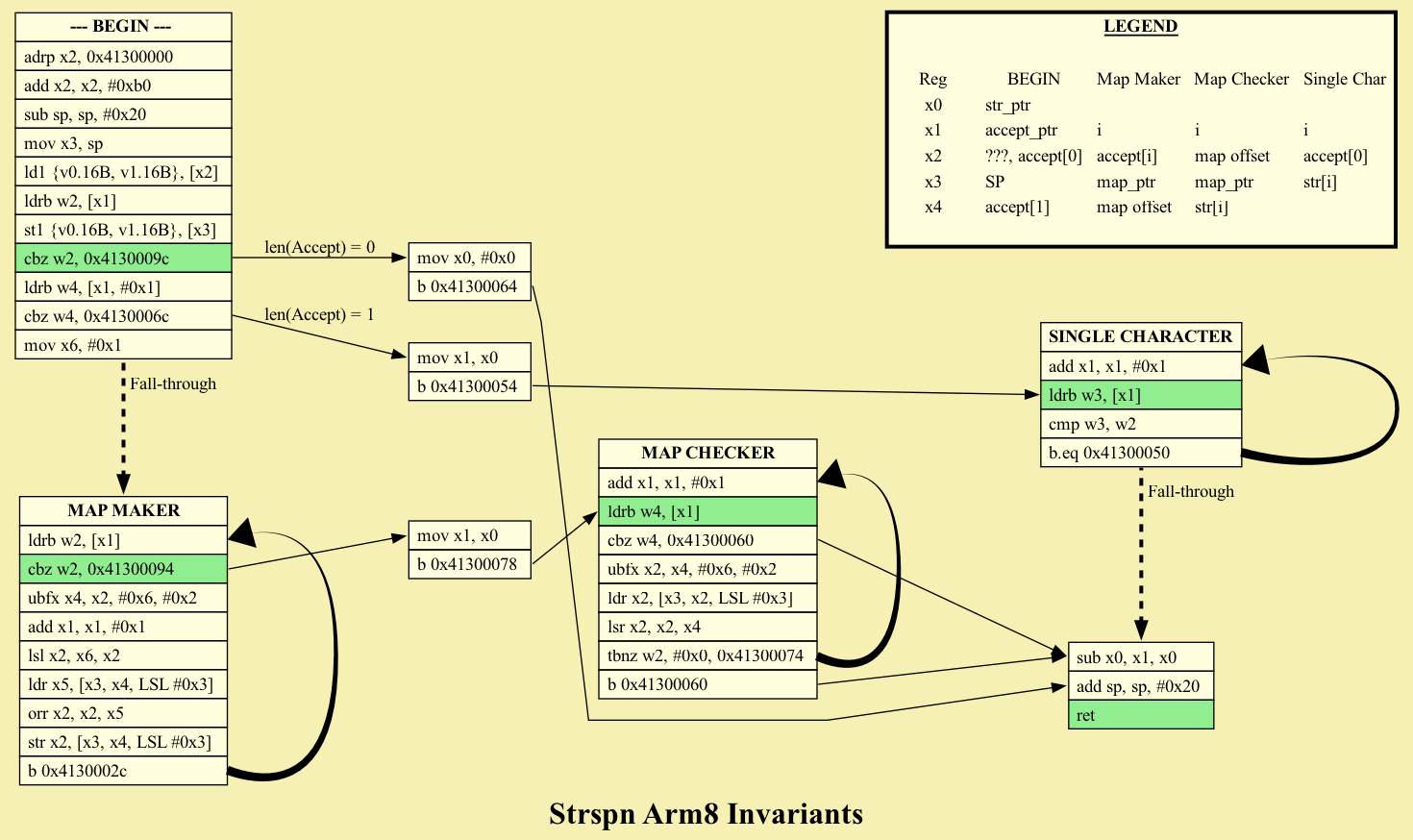
Resources
The list below captures my suggestions for learning and appreciating the tools I find useful in my research. It is lean in order to provide new learners a clear direction. There are so many resources available on the web newcomers are cursed with the daunting task of deciding where to start and deciphering what is relevant and what is not. It is free in order to not pose any monetary barriers to beginners and dabblers. If anything is not free then the link is outdated or I have made a mistake. I hope this list will help folks interested in this line of research take their first effortless steps.
| Tool / Skill | Resources |
|---|---|
| Assembly | OpenSecurityTraining.info has a course. You can also look at this reference manual for the ARMv8-M architecture to see what that's like :) |
| Bash | I don't remember how I learned Bash, but this guide looks useful. Please note that learning Bash, and any language, is a marathon. You can't learn all of the fine details in your first sitting. It's an iterative process of learning and applying. |
| Coq | The canonical and indispensible resource for learning Coq is Volumes I & II of Software Foundations. |
| CLI Tools | I also don't remember how I learned CLI tools, but lukesmith's productivity videos (example) were a big inspiration. Recently, I found the Bandit wargame at overthewire.org to be a kind and joyful introduction to some linux and cybersecurity fundamentals. |
| Python | I recommend Automate The Boring Stuff , though note that Python is overkill for many things like text processing and file manipulation. A shell scripting language like bash is a more lightweight wrapper for the underlying cli tools that Python uses anyways. This inspiring video convinced me that programming fluency is a powerful aide to the powers of good. |
| Computer Science | I think teachyourselfcs.com has a great teaching / learning philosophy and learning recommendations. Their public advice is free, and itself is useful. Some of their textbooks aren't freely available, and their paid bootcamps I cannot attest to. |
Opportunities
I am looking for interested and capable undergraduates to assist with a variety of projects to support and directly contribute to my research. The smaller projects are great for students that have developed skills but find themselves without a directed outlet to apply them. Sizeable projects will involve paid compensation; novel insights that spur research results will result in authorship credit in the relevant research publication. I am open to working with talented and mature high schoolers, but I will have to consult our legal department to see if there are any complications. You can see a list of projects and their basic requirements below.
| Project Description | Skills Required / Developed |
|---|---|
| Restructure and add features to a Ghidra pcode to Picinae IL translator. | Python, Coq |
| Design and create a CVE explorer app using an offline copy of the NVD. | HTML, CSS, Javascript, Bash, cli tools |
| Create or polish an Assembly-to-CFG graph generator to produce graphs like the above. | Bash, cli tools, LLM integration (optional) |
| Picinae IL representation optimization - essentially create compiler optimization passes. | Coq, compiler optimization |
| Find new graph-query templates for finding possible software vulnerabiliites. | Binary exploitation, compilers, graph querying |
| Develop and prove functional correctness specifications for libc functions. | Coq/Picinae, assembly, formal methods |
If you would like to work with me on any of these projects please follow these instructions.
- Find / figure out my email. You do not need to break any laws to do this, so don't overthink it.
- Send me an email with "SUNFLOWER Project" as the subject and the following contents.
- Which project you'd like to work on.
- A summary of what you bring to the table, including links to relevant pieces of your portfolio.
- A summary of what you'd like to get from working together.
- Optional: please read the question-asking guides linked below.
On the other hand there's this SO guide on answering questions.
Jon Skeet's checklist version is reproduced here:
- Have you done some research before asking the question?
- Have you explained what you’ve already tried to solve your problem?
- Have you specified which language and platform you’re using, including version number where relevant?
- If your question includes code, have you written it as a short but complete program?
- If your question includes code, have you checked that it’s correctly formatted?
- If your code doesn’t compile, have you included the exact compiler error?
- If your question doesn’t include code, are you sure it shouldn’t?
- If your program throws an exception, have you included the exception, with both the message and the stack trace?
- If your program produces different results to what you expected, have you stated what you expected, why you expected it, and the actual results?
- If your question is related to anything locale-specific (languages, time zones) have you stated the relevant information about your system (e.g. your current time zone)?
- Have you checked that your question looks reasonable in terms of formatting?
- Have you checked the spelling and grammar to the best of your ability?
Courses
I will be teaching an undergraduate course about logic programming in the fall of 202X. The intention is to provide students with Perspective, Joy, and Confidence with respect to Logic programming. A Perspective,or awareness, of what it is, what it can do, and how it is being used in commercial applications. An opportunity to experience the Joy of using it to express themselves and harnessing its problem solving powers. A Confidence that they can pick it back up when the time is right, even if they only find a use case that begs for it a decade down the line.
Course Outcomes
After this course you will be able to...
- Reason about recursive relations.
- Feel comfortable writing Prolog code and navigating the online documentation.
- Proficiently use Constraint Logic Programming, Discrete Clause Grammers, and data structures to solve problems using Prolog.
- Design and implement automated reasoning, planning, and search in a logic programming environment.
- Understand ontologies, their structure, design, and implementation and implement a simple one yourself.
- Translate natural language problems into formal specifications of correctness into logic programs that solve them.
Course Materials
Course Syllabus
Textbooks
- The Art of Prolog - available for free at the publisher's website
- The Power of Prolog - free
- Knowledge Representation, Reasoning, and the Design of Intelligent Agents - available online for free through the UTD library
- The Calculus of Computation - available online for free through the UTD library
Documentation
Course Content
| Date | Topics |
|---|---|
| 8/25/2025 |
|
| 8/27/2025 |
|
| 9/1/2025 |
|
| 9/3/2025 |
|
| 9/8/2025 |
|
| 9/10/2025 |
|
| 9/15/2025 |
|
| 9/17/2025 |
|
| 9/22/2025 |
|
| 9/24/2025 |
|
| 9/29/2025 |
|
| 10/6/2025 |
|
| 10/8/2025 |
|
| 10/13/2025 |
|
| 10/15/2025 |
|
| 10/20/2025 |
|
| 10/22/2025 |
|
| 10/27/2025 |
|
| 10/29/2025 |
|
| 11/3/2025 |
|
| 11/5/2025 |
|
| 11/10/2025 |
|
| 11/12/2025 |
|
| 11/17/2025 |
|
| 11/24/2025 |
|
| 11/26/2025 |
|
| 12/1/2025 |
|
| 12/3/2025 |
|
| 12/8/2025 |
|
